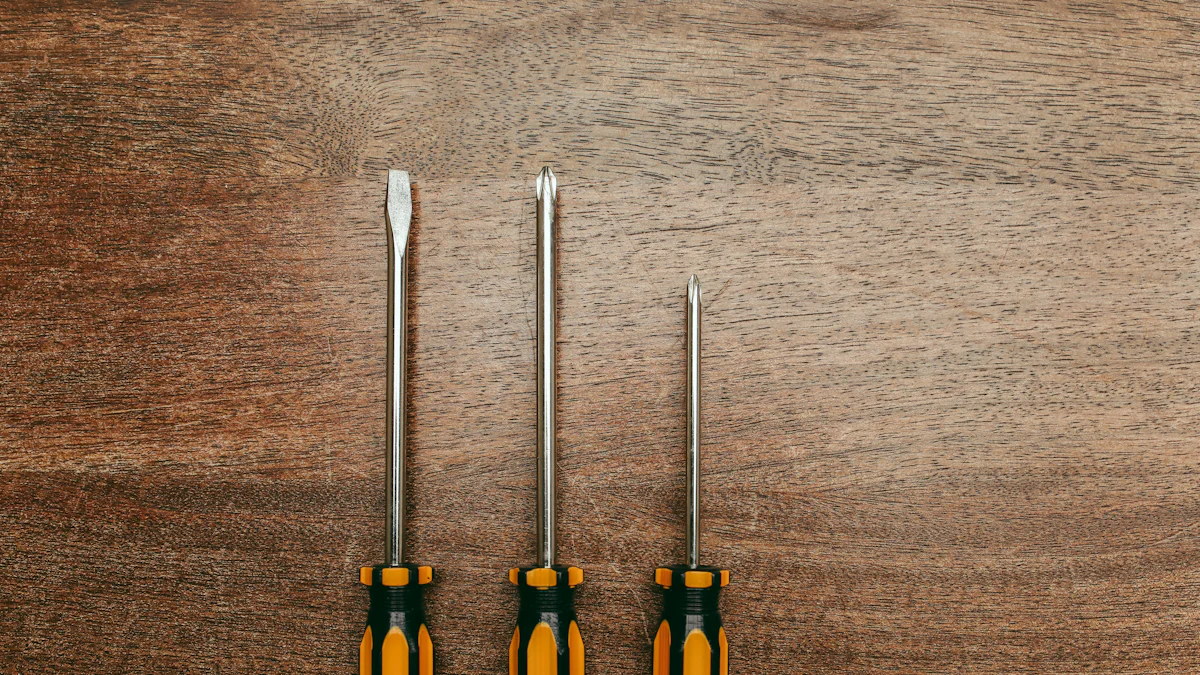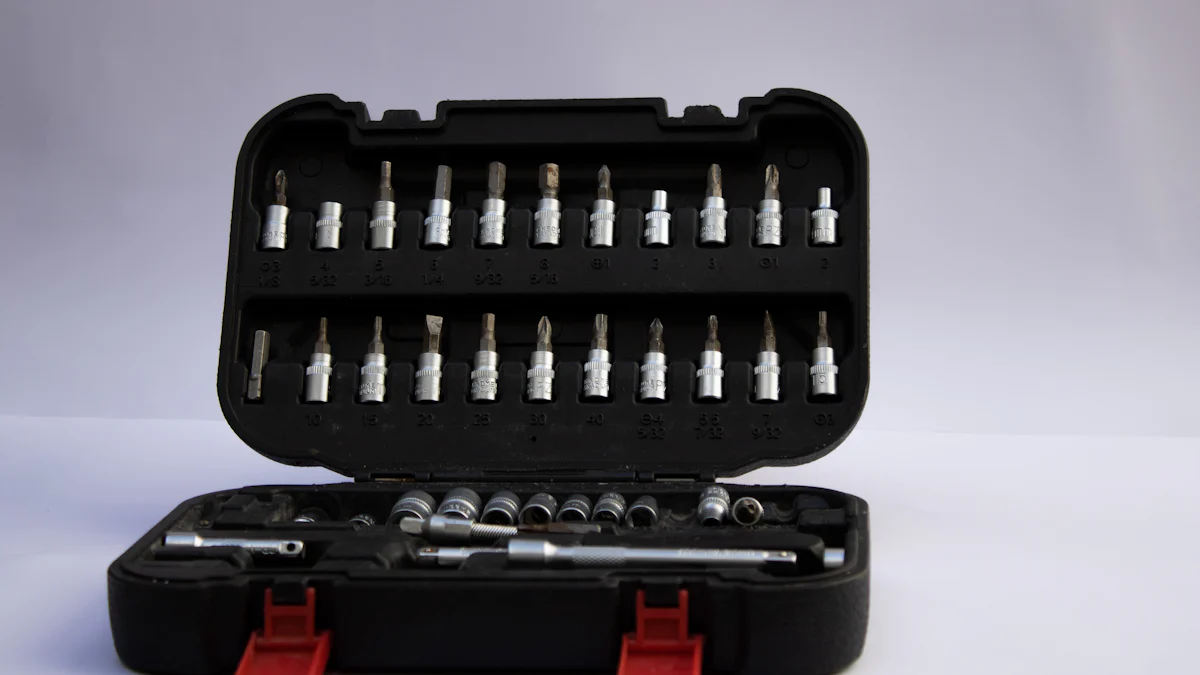
When it comes to tools, the socket screwdriver stands out for its versatility and efficiency. Understanding the nuances of different types is crucial for any handyman or DIY enthusiast. By delving into the specifics of each variation, one can elevate their craftsmanship and tackle a myriad of projects with precision. Embracing this knowledge opens doors to a world of possibilities in the realm of repairs and constructions.
Types of Socket Screwdrivers

Hex Socket Screwdrivers
Hex socket screwdrivers, known for their six-sided design, offer excellent grip and stability when working with hexagonal fasteners. These screwdrivers are commonly used in furniture assembly, bicycle repairs, and machinery maintenance due to their compatibility with a wide range of hex bolts and screws.
Features
- Six-sided socket design for enhanced grip
- Available in various sizes for different applications
- Durable construction for long-lasting use
Common Uses
- Furniture assembly and disassembly
- Bicycle repairs and adjustments
- Machinery maintenance and repair tasks
Advantages and Disadvantages
Advantages:
- Excellent grip on hexagonal fasteners
- Versatile usage in various industries
- Durable construction ensures longevity
Disadvantages:
- Limited compatibility with non-hexagonal screws
- May not be suitable for all types of fastening tasks
Torx Socket Screwdrivers
Torx socket screwdrivers, featuring a star-shaped tip, are renowned for their ability to handle high torque applications effectively. These screwdrivers are commonly utilized in automotive repairs, electronics assembly, and household appliances due to their superior torque transmission capabilities.
Features
- Star-shaped tip for increased torque capacity
- Precision engineering for optimal performance
- Resistant to cam-out during operation
Common Uses
- Automotive repairs and maintenance
- Electronics assembly and disassembly
- Household appliance installations
Advantages and Disadvantages
Advantages:
- High torque transmission capability
- Reduced risk of cam-out during operation
- Ideal for applications requiring extra power
Disadvantages:
- Limited compatibility with non-Torx fasteners
- Specialized use may not be suitable for all projects
Phillips Socket Screwdrivers
Features
Common Uses
Advantages and Disadvantages
Slotted Socket Screwdrivers
Features
- Slotted socket screwdrivers are characterized by a flat, single-slot tip that allows for easy engagement with slotted screws.
- These screwdrivers come in various sizes to accommodate different screw dimensions, providing versatility for a wide range of applications.
- The flat tip design ensures a secure fit into slotted screws, minimizing the risk of slipping during operation.
Common Uses
- Slotted socket screwdrivers are commonly employed in woodworking projects, electrical installations, and vintage machinery repairs.
- They are ideal for tasks that involve traditional slotted screws found in older equipment and household fixtures.
- Craftsmen and electricians often rely on these screwdrivers for their simplicity and effectiveness in handling basic fastening needs.
Advantages and Disadvantages
Advantages:
- Easy identification due to the distinct single-slot design.
- Versatile usage across different industries and applications.
- Simple construction makes them easy to use for beginners.
Disadvantages:
- Limited compatibility with non-slotted screw types.
- May not provide optimal torque transmission compared to other specialized sockets.
Choosing the Right Socket Screwdriver
Factors to Consider
Type of Work
When selecting a socket screwdriver, consider the specific tasks you will be undertaking. Different projects require varying levels of torque and precision, so it’s essential to match the tool to the job at hand.
Material Compatibility
Socket screwdrivers come in a range of materials, each offering unique benefits. Understanding the compatibility between the tool material and the fasteners you work with is crucial for efficient and effective use.
Durability and Quality
Prioritize durability and quality when choosing a socket screwdriver. Opt for tools made from high-quality materials that can withstand frequent use without compromising performance.
Tips for Selection
Brand Reputation
Research reputable brands known for producing reliable socket screwdrivers. A brand’s reputation often reflects the quality and durability of their tools, ensuring a worthwhile investment.
User Reviews
Consult user reviews to gain insights into real-world experiences with different socket screwdrivers. Feedback from other users can provide valuable information on performance, durability, and overall satisfaction.
Price vs. Quality
While cost is a factor to consider, prioritize quality over price when selecting a socket screwdriver. Investing in a high-quality tool may initially cost more but can save money in the long run by offering longevity and superior performance.
Maintenance and Care

Cleaning Tips
Regular cleaning of socket screwdrivers is essential to maintain their functionality and longevity. It involves removing dirt, debris, and grease from the tools after each use. This practice prevents build-up that could affect the performance of the screwdrivers over time.
Deep cleaning should be performed periodically to ensure thorough maintenance of socket screwdrivers. This process involves disassembling the tools, inspecting each component for wear or damage, and meticulously cleaning all parts before reassembling them. Deep cleaning helps identify any potential issues early on and extends the lifespan of the screwdrivers.
Storage Solutions
Proper storage is key to preserving the quality of socket screwdrivers when not in use. Toolboxes are an excellent storage solution as they offer protection from external elements and keep the tools organized and easily accessible. Storing screwdrivers in designated slots within a toolbox minimizes the risk of damage or misplacement.
Wall mounts provide an alternative storage solution for socket screwdrivers, especially in workspaces with limited surface area. Mounting racks on walls not only save space but also keep the tools visible and within reach during projects. This storage method enhances efficiency by maintaining a clutter-free work environment.
Longevity Tips
To ensure the longevity of socket screwdrivers, proper usage practices must be observed. Avoid applying excessive force or using the tools for tasks beyond their intended capacity to prevent premature wear or breakage. Using the right size socket for each fastener minimizes strain on both the tool and the fastener itself.
Regular inspections are crucial for detecting any signs of wear, damage, or malfunction in socket screwdrivers. Inspecting components such as sockets, handles, and ratchets allows for timely maintenance or replacement of worn-out parts before they compromise tool performance. Routine checks contribute to prolonged usability and effectiveness of the screwdrivers.
- In summary, understanding the nuances of various socket screwdrivers is key to enhancing craftsmanship and project precision.
- Choosing the appropriate socket screwdriver for each task ensures efficient and effective results.
- Readers are encouraged to apply their newfound knowledge in their repair and construction endeavors.
- Your feedback and questions on socket screwdrivers are welcomed to further enrich your understanding.
